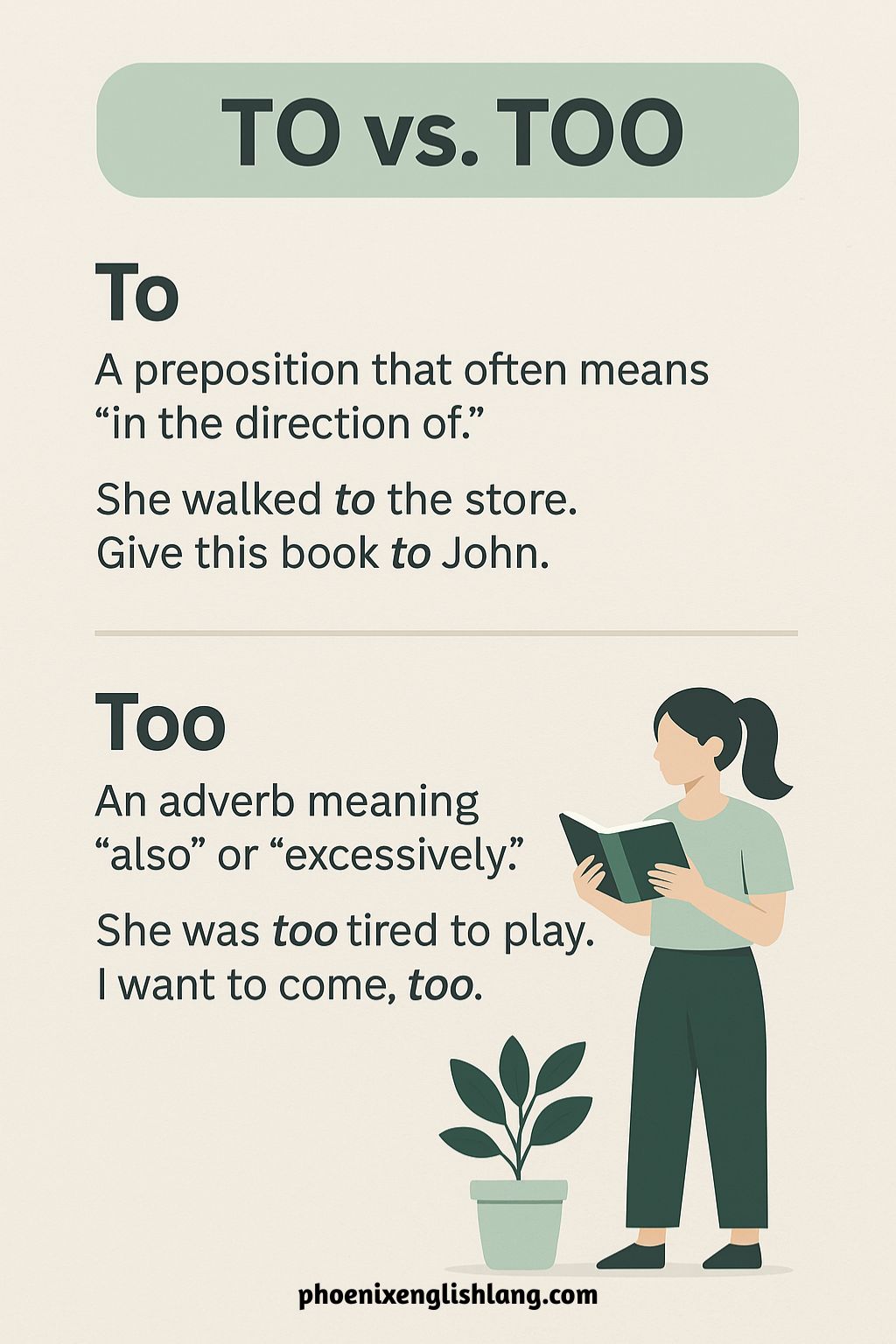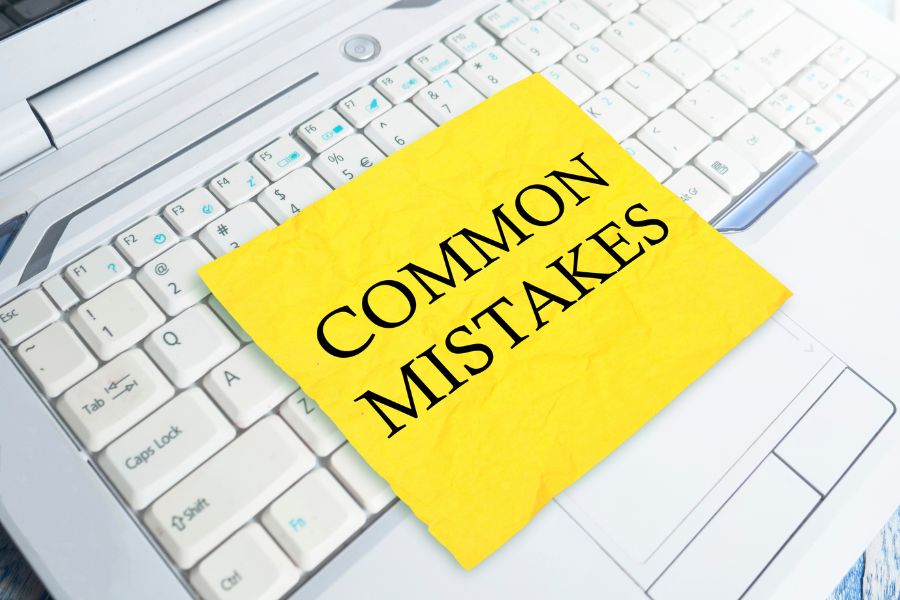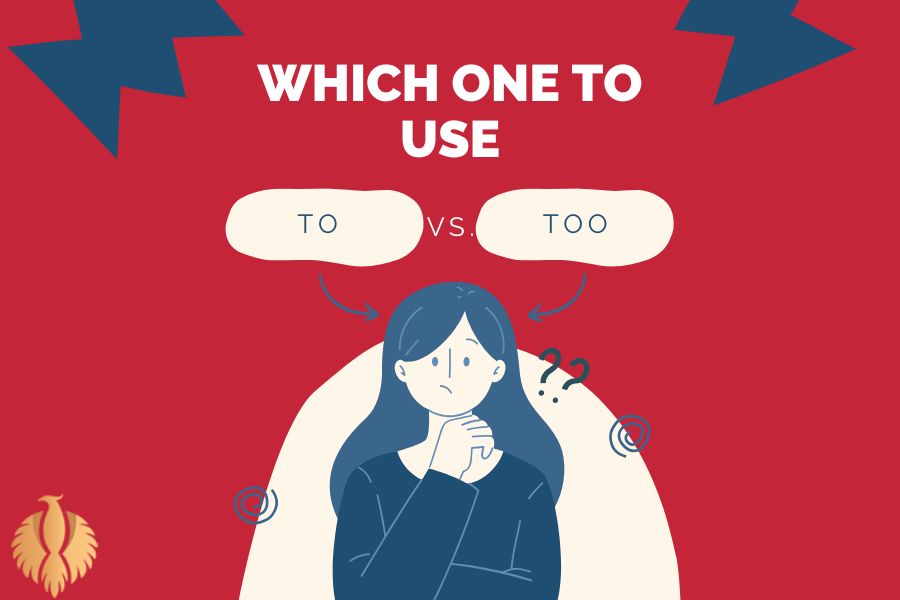‘To’ and ‘too’ may sound the same, but they have totally different meanings. ‘To’ is a preposition or part of a verb, like in ‘go to school’ or ‘want to leave.’ ‘Too’ means ‘also’ or ‘excessively’, like in ‘you too’ or ‘too salty.’
Some words in English just love to cause trouble.
Not because they’re weird or hard to spell, but because they look or sound almost exactly like another word.
‘Your’ and ‘you’re’ have been battling for ages.
‘There’, ‘their’, and ‘they’re’ keep tripping people up.
We mix up ‘then’ and ‘than’ all the time; ‘better then you’ vs. ‘better than you’ might look close, but only one is right.
Or take affect and effect; one’s usually a verb, the other a noun, but they still manage to confuse almost everyone.
Even accept and except sound nearly the same, yet one means to receive and the other means to leave out.
Even native speakers second-guess themselves sometimes.
And then we have to and too.
Simple? They seem simple. But the moment you need to type a sentence quickly or send an important email, your brain suddenly freezes: “Wait… is it to or too?”
This kind of confusion isn’t just a beginner-level mistake.
It happens across the board, from middle school students to seasoned writers. Why?
Because English is sneaky. It gives us words that sound the same (hello, homophones), but they each carry their own meaning, purpose, and personality.
And once you mix them up, the sentence might still “sound” fine… but it’s technically wrong. Annoying, right?
But here’s the good news: this stuff is totally fixable.
You don’t need to memorize a million grammar rules or bury your head in a textbook.
You just need a few clear examples, a couple of easy tricks, and maybe a laugh or two along the way.
So if you’ve ever stared at a sentence like “Me to” and wondered what’s missing, or maybe “too fast” made you second-guess yourself, you’re not alone.
This guide is here to clear up the confusion, once and for all.
Let’s make to and too the kind of words you never stress about again.
You might also enjoy: That vs Which | Correct Usage + 2025 Examples

What Does “To” Mean?
Before we move on to usage, let’s analyze various definitions of ‘to’:
1. expressing motion in the direction of (a particular location).
2. approaching or reaching (a particular condition).
3. used with the base form of a verb to indicate that the verb is in the infinitive.
4. used without a verb following when the missing verb is clearly understood.
Okay, so here’s the thing about ‘to ‘. You’ve seen it a million times.
You’ve written it, said it, probably even overused it without a second thought.
It’s everywhere. It’s like the salt of the English language. Not flashy. Not dramatic. But sprinkle it in, and suddenly the whole sentence works.
But what does it actually mean?
Well, to wears many hats. Sometimes it’s showing direction, where something’s headed, literally or emotionally.
Other times, it’s glued to a verb like a sidekick, quietly helping that verb exist in its original, unchanged form.
It’s the helper that never complains. The quiet kid in the group project who ends up doing half the work.
Let’s say you’re tired. You want to sleep. You want to scream. You want to drop everything and move to a cabin in the woods where no one can email you ever again.
See what happened there? The word ‘to’ made those actions possible.
Without it? You’re just awkwardly throwing verbs around. “I want sleep”? Nope.
Something’s missing. Something small but crucial. That’s to.
Or maybe you’re on the move. You’re walking to the kitchen for a snack you don’t need but emotionally require.
You’re driving to work with a 20% battery and no will to socialize. Wherever you’re going, to is the arrow pointing there.
Let’s zoom in:
‘ I need to finish this report before the meeting.’
Without “to finish,” it’s just “I need… this report”? What? For what? For kindling? To gives it action.
‘ She ran to the bus stop but still missed it.’
Ouch. But also, “to the bus stop” tells us where she ran. No to, no direction. Just running. Forever.
So yeah. To isn’t loud. It doesn’t need a spotlight.
But once you get what it does? You’ll start noticing it everywhere, and you’ll never look at it the same again.
What Does “Too” Mean?
Ah, too. The slightly extra, slightly emotional cousin of to.
It’s the word that says, “Me too!” or “This is too much!” and actually means it.
These are the standard definitions of ‘too’:
1.to a higher degree than is desirable, permissible, or possible; excessively.
2.in addition; also.
So what does too do, exactly?
It usually pops up in two main ways:
You might also enjoy: Acception vs. Exception: Difference + Examples + Spelling
‘too: as well’
First, it can mean ‘also’ or ‘as well’. Like, I’m tired too.
Or She likes horror movies too. It adds on, like a soft “same here” at the end of your thought.
It’s the little glue word that joins one experience to another without making a big deal about it.
‘Can I come too?’
Simple. Friendly. That too is saying, “Hey, I’d like to join,” without needing a whole explanation. Not to. Not two. Just too, tagging along politely.
‘too: excessively’
Then, there’s dramatic too.
The kind that means excessively, over the limit, more than enough, and sometimes, way more.
You know the vibe: This coffee is too hot.
That movie was too long. He’s too nice. Like, suspiciously nice.
It doesn’t just describe something, it throws a bit of personal feeling into the mix.
Like, yeah, we get it. It was too much.
‘It’s too late to say sorry now.’
Oof. This one cuts. That too is the tipping point.
It’s not just “late.” It’s too late, like the door has officially closed, the window’s shut, and the chance is gone.
So yeah, too might seem unimportant, but don’t let it fool you. It carries weight. It adds depth.
Common Mistakes with “To,” “Too,” and “Two”

Alright, let’s address the messy trio.
Not just ‘to’ and ‘too’;we’ve also got ‘two’ in the mix.
Three little words, same pronunciation, completely different jobs.
Honestly, it’s no wonder people mix them up. They sound exactly the same when you say them out loud.
You could whisper “I want to go too” and someone might hear “I want two go to.” Total chaos.
English can be a troll sometimes.
So first things first: these mix-ups aren’t rare. They’re everywhere, from emails and text messages to social media captions and even professional writing.
And you know what? It happens to the best of us.
Your brain might know the difference, but when you’re typing fast, tired, or on your third cup of coffee, your fingers might betray you.
Let’s break it down:
To is the worker bee. It shows direction (go to the store) or introduces an action (to sleep, to eat, to dance).
Too is the emotional one. It means also, or more than enough. It shows up when you’re trying to say, “same here,” or “whoa, that’s a bit much.”
Two is just the number 2. That’s it. Nothing deeper. It’s math, not grammar. But because it sounds identical, it gets tangled in the drama anyway.
Some examples of how things go wrong:
בI want too go to the party.’×
Oops. “Too” doesn’t belong here. It should be to go, unless you’re trying to say you’re going also, then you’d need two tos and a too (we’ll get to that chaos in a sec).
בThere are two many people in the room.’×
Wrong word, wrong spelling. It should be too many, not two many.
Unless you meant exactly two people, even then you should omit ‘many.’
בI have to cats.’×
Common typo. It should be two cats, unless you’re saying you have to [do something] to cats, for which you would need a verb as well.
And here’s the ultimate sentence that melts people’s brains:
‘I want to go to two stores too.’
Three different “to/too/two”-sounding words.
All correct. All necessary. But if you swap even one of them out, the sentence either makes no sense or feels off.
That’s the tricky part. Because they sound the same, our brains often go on autopilot and pick the wrong one.
It’s like your fingers just assume they’re all the same word wearing different outfits
But they’re not. They’re separate words with unique jobs.
The good news? Once you’ve really locked in their roles, you’ll start noticing the mistakes more quickly.
Oh, and there is a slight pronunciation difference as well.
While two and too are pronounced the same, to can sound slightly shorter or less stressed in casual speech. It’s subtle, but that tiny difference in rhythm can sometimes help listeners catch which word you mean.
It’s like your inner grammar radar sharpens. And honestly, just being aware that they’re often confused is half the battle.
You might also enjoy: Seeked vs. Sought: Correct Usage + Examples
Examples

Examples with ‘to’
1. I was just about to leave when the sky opened up and poured like it had something to prove.
2. She wanted to scream, to cry, to say something, anything, but instead, she just sat there, silent.
3. He promised to be there, but when I looked around the empty room, it was clear he never meant it.
4. I stayed up all night just to watch the sunrise, hoping it would bring some kind of clarity.
5. We drove out to the old cabin, not because we wanted to escape, but because we needed to remember who we were.
6. I forgot to lock the door again. That’s twice this week. Maybe I’m more distracted than I thought.
7. He reached out to take her hand, but she pulled away before he could touch her fingers.
8. To tell the truth, I still think about what we could have been if we’d just been a little braver.
9. She tried to laugh it off, but the tightness in her smile gave her away.
10. I came all this way to say one thing, and now that I’m here, the words just won’t come out.
11. They used to come to this spot every Friday, like some unspoken tradition that neither of them wanted to break.
12. I told myself not to care, not to hope, but one text from him and suddenly I’m 17 again.
13. He was about to speak, but something in her eyes told him not to.
14. I want to move on, to start over, but part of me still clings to what we had.
15. She offered to help carry my things, even though her own arms were already full.
16. He came to apologize, and even though I didn’t say a word, somehow, he knew I forgave him.
17. I planned to tell her how I felt, but then she smiled at someone else, and the moment slipped away.
18. We walked to the end of the street in silence, both of us pretending the distance didn’t mean anything.
19. To love someone is one thing; to let them go, that’s the real test.
20. I wanted to believe we were okay, but deep down, I knew we were pretending.
You might also enjoy: Receive vs. Recieve: Correct Spell + Examples [2025]
Examples with ‘too’
1. I miss her too, even though I act like I’ve moved on and talk about someone new.
2. It was too late to take it back, and the look in her eyes told me she’d already shut the door for good.
3. You’re too kind to people who wouldn’t lift a finger for you, and it breaks my heart to watch.
4. That movie dragged on for too long; by the end, I couldn’t even remember why I cared.
5. I laughed too hard at his joke, not because it was funny, but because I didn’t know how else to break the tension.
6. It’s too cold out tonight. Not just the weather, but everything feels distant and a little too quiet.
7. She tried too hard to be perfect, and in the process, forgot how to just be herself.
8. I’ve been too tired lately to pretend I’m okay when I’m clearly not.
9. That song reminds me too much of us, it sneaks into my playlists and ruins my day.
10. You’re too good for him, and deep down, I think you know it too.
11. I brought snacks for the road trip, but Sarah surprised everyone by packing sandwiches too, which honestly saved us from stopping at yet another gas station diner.
12. We were planning to renovate the kitchen this year, and now, somehow, we’ve committed to updating the bathroom too; because apparently, one project at a time is too reasonable.
13. I noticed the neighbors had started decorating for Halloween, and the next morning, our kids begged us to get fake spiderwebs and glowing pumpkins too.
14. The dog jumped into the lake without hesitation, and to our shock, the cat followed too, probably just to prove it could.
15. I signed up for the cooking class, and when I walked in, I saw Jake there too, equally confused about how to hold a chef’s knife properly.
16. The intern asked for a raise, and to everyone’s surprise, the quiet guy from accounting did too, turns out he hadn’t taken a vacation in three years.
17. When the power went out during the storm, I lit some candles, and then heard someone down the hall playing guitar too, like the blackout had turned into open mic night.
18. I mentioned my laptop was acting up, and my colleague nodded and said hers had started crashing too, like our tech was in on a silent protest.
19. The toddler refused to eat broccoli, and when I turned to encourage her, she started crying.
20. We booked a weekend in the mountains just to unwind, and somehow, our friends ended up renting the cabin next door too.

Hi, welcome to my blog! My name is Omid and I am thrilled to have you here! I am an English language teacher with 12 years of experience and hold multiple international certifications (TESOL, IELTS, TOEFL, PTE, CELTA). Additionally, I hold a PhD in Applied Linguistics with a specialization in Teaching English as a Second Language (TESL), which fuels my passion for teaching English and assisting others in mastering the language. To me, nothing is more rewarding than helping individuals enhance their English language abilities through various methods. So, let’s embark on this journey of learning English together.




